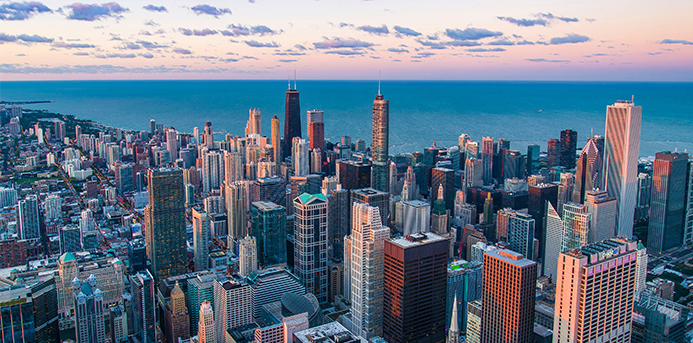As President of the Metropolitan Planning Council, an independent, nonpartisan nonprofit serving our civic needs, for the past 21 years, MarySue Barrett has been leading the organization’s strategic work with government, business and community leaders to foster best practices and public policies that improve life and business throughout the Chicago region. Some of their recent initiatives include improving our river system and water management, transportation, reducing segregation, and collaborations that grow good business and shrink inefficient government.
MPC fosters strong partnerships rooted in respect, listening and trust — qualities that need amplifying more than ever.
At MPC’s recent annual luncheon, “Creating a Winning City,” Barrett offered her “recipe” for a successful region:
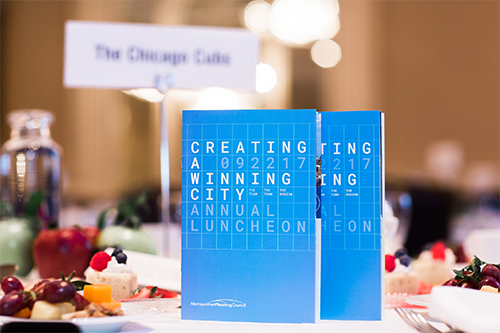
1. If we challenge inequality, we will grow.
MPC’s Cost of Segregation study documents the staggering expense of inequity across our region — billions in lost wages, thousands of young people without the education to fulfill their potential, and hundreds of lives cut short by violence. This groundbreaking report, released in partnership with the Urban Institute, demonstrates in stark terms that segregation touches everybody in the Chicago region, no matter where they live. If we achieve inclusion, we will grow.
2. Focus on the building blocks of a healthy region.
MPC will deploy any tool in the toolbox. Depending on the challenge, it could be research, advocacy, or a demonstration project. They’ll do whatever it takes to move solutions forward. Take infrastructure investment: It’s a building block of who we are, because of where we are, and it’s our future. If we coordinate land uses, we can deal with our flooding problem, as MPC does regularly with Calumet River basin stakeholders. If we invest in transit with housing, we can attack traffic gridlock. MPC’s partners at UPS told them that a five-minute delay per driver per day costs $105 million a year, demonstrating the rippling economic impact of infrastructure investments — or of disinvestment. MPC is all about putting those pieces together.
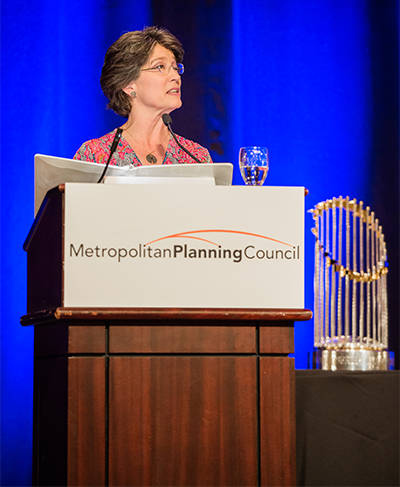
3. Collaboration is an unnatural act.
MPC is known for bringing together different parties — governments, business, philanthropy. A few years ago, changes in Uptown opened up desirable land near transit, and with it, new opportunity. Through their Uptown Corridor Development Initiative, MPC engaged an alderman, city officials, community organizations and neighbors to chart a smart course forward. By bringing folks together, we strengthen our collaboration muscles.
4. Ask local experts, don’t tell.
MPC works directly with people and organizations in neighborhoods throughout the Chicago region, providing technical support, making new connections, adding insights, and — a biggie — figuring out financing. In order to launch Our Great Rivers, a bold vision for Chicago’s rivers, MPC first asked residents: What is your vision for Chicago’s rivers and riverfronts? They organized nine community open houses, factory visits, paddling trips, walking tours, bike rides, boat cruises, design workshops and more. The results were inspiring. And the conversation continues: MPC is partnering with Mayor Rahm Emanuel and the Department of Planning and Development on the River Edge Ideas Lab, an exhibit showcasing concepts for our rivers from nine world-renowned architects.

5. We get the government we demand.
MPC is demanding better. Single-purpose governments such as local highway or individual school districts — what’s up with that? Creating a 21st century urban region won’t happen with outdated, fragmented governance. That’s why MPC is part of a growing chorus working for change. They advocated for legislation that empowers county leaders to consolidate local governments, which passed earlier this summer. This victory reminds MPC and their Transform Illinois partners that bipartisanship is possible, change is possible, and an effective, streamlined government is closer than ever before.
Barrett emphasizes, “By challenging inequality, focusing on our building blocks, collaborating, asking questions, and demanding better government, we will accelerate our reinvention. These are the ingredients of how we will create a successful and winning region.”
The luncheon offered additional evidence of MPC’s importance to Chicago’s civic life. Madison Dearborn Partners Chairman John A. Canning, Jr. received the Champion Fighter Award. Partnerships that strengthen our city were discussed by Chicago Cubs Chairman Tom Ricketts and WBEZ’s Natalie Moore.
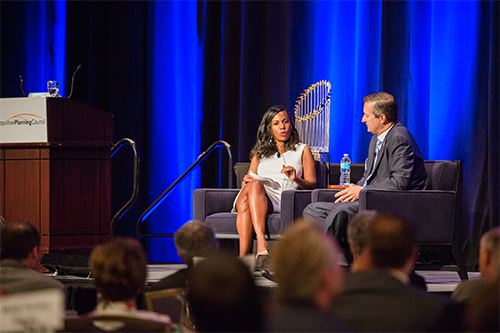
Make It Better is proud to have been a media partner for this event and to provide ongoing support for the important work of the Metropolitan Planning Council.
More from Make It Better:
- Why the YMCA Has Stood the Test of Time
- The Investment Conference Smart Investors Won’t Want to Miss
- North Shore Sisters Form Nonprofit to Provide Urgent Support to Puerto Rico — Here’s How You Can Help Them
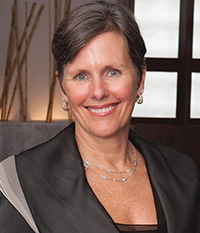
Susan B. Noyes is the founder of Make It Better. She practiced labor law at Sidley & Austin before deciding to lay down the law full-time for her six children instead. Her favorite time of the day is family dinner, despite her children’s constant misbehavior. Susan loves to network, build community, write and organize lots of moving pieces. Her motto: “A clean home is a wasted life.”
